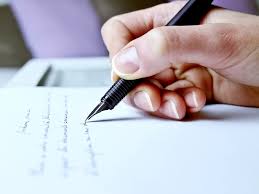
What are ideal conditions for writing? Far be it for me to offer advice, but since you didn’t ask, I’ll relent.
First of all, it is a myth that poetry, unlike it’s more verbose cousins (novels, short stories, essays) is best written on paper. Sure, many famous poets wax poetic (what else?) about blue ink on long yellow legal pad or in Moleskine notebook, but me, I find the blizzard-like beauty of Word’s lovely docx white just as enticing. Why? To preserve erasers. Nothing gets revised as many ways to Sunday as a poem suffering birthing pains. The confetti of eraser shreddings gets bothersome.
Writing position? As the Poles say, in their poetic way, on your dupa. (If you’re Polish and notice a misspelling, please forgive me.) I love Mark Twain, but never understood his habit of writing in bed. Isn’t there a famous blues song, after all, called “Don’t Write in Bed”? (Ear worm works its way into my cochlea.)
Writing atmosphere? We cannot control the high and low pressure systems the Weather Gods (and their often inept interpreters, meteorologists) send our way, but we can adjust ambience. For me, poetry is best written to classical music. Reason? The aforementioned ear worm. When the music lacks invasive lyrics, it doesn’t turn and do its night crawl through our Muse’s ears.
Music with lyrics is like someone reading over your shoulder. Or worse, someone whispering another man’s poem in your ear while you are trying to compose your own. Have you ever tried to recall a song while another is playing? It puts the caco- in cacophony, let me tell you.
Some of my favorites? I love the Estonian wonder, Arvo Pärt, and his tintinnabulation. Kind of like Poe’s bells, bells, bells, only Pärt does it with more than bells and the quality is much higher than Poe’s. Like Bach, Pärt’s also fond of repetition. Wave upon wave of musical refrain and echo. Are these not musical tools in the poet’s toolbox, too?
When Pärt is not around, I go with Johann Sebastian himself. Or Sibelius, whose music has a nice Finnish to it (and please don’t groan — the Bard is fond of puns, too, and no one groans when he delivers them).
Finally, before I sit down to classical music at the word processor and begin to write, I like to read good poetry for at least a half hour. Wonderful word play by masters sets the tone. Inspires. Fools me into saying, “Shoot. I can do that!” And, make no mistake, this conceit must be present, even if it is a wild conceit.
Results may vary, as they say. As will definitions of “ideal” when talking about conditions. As long as you have some, is all. Conditions that work for you, I mean.
Happy writing.